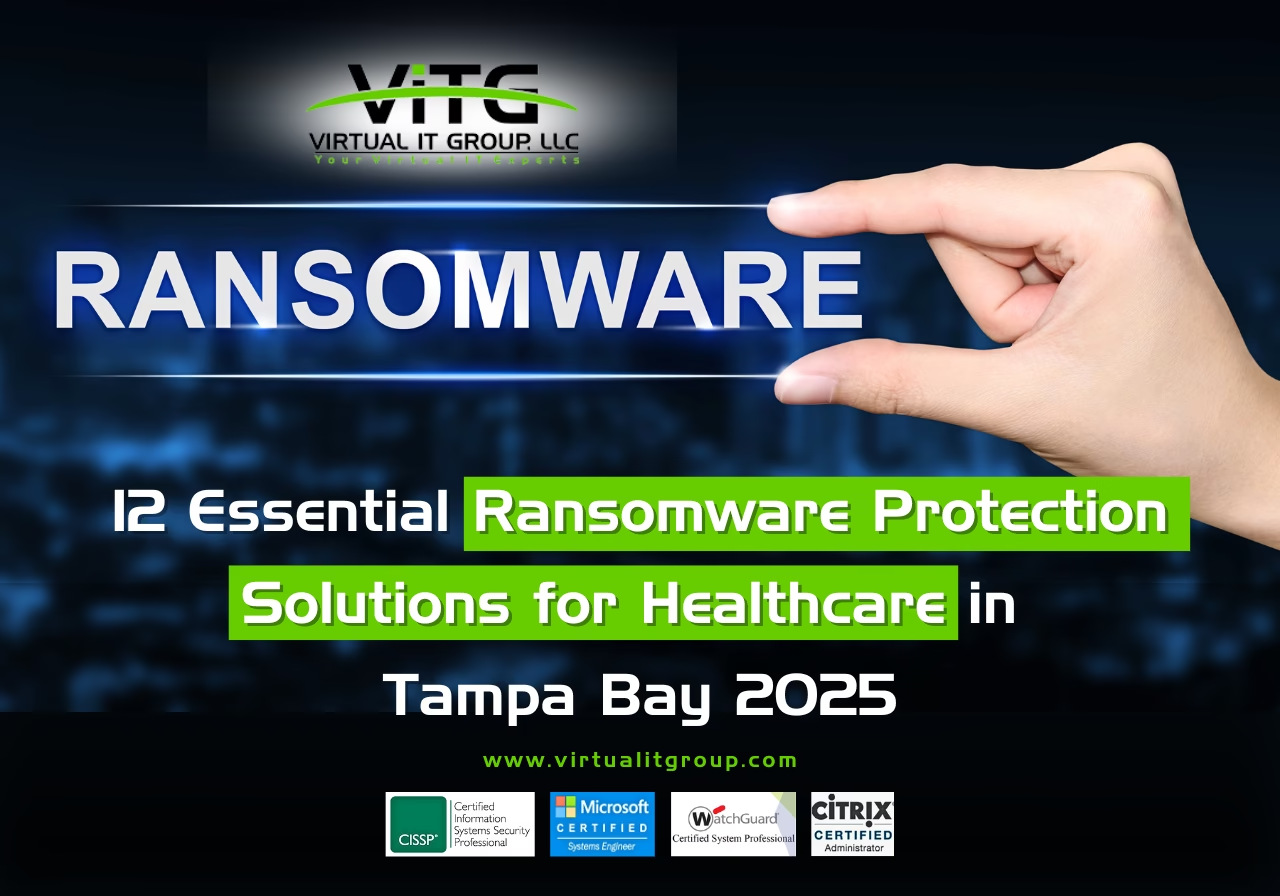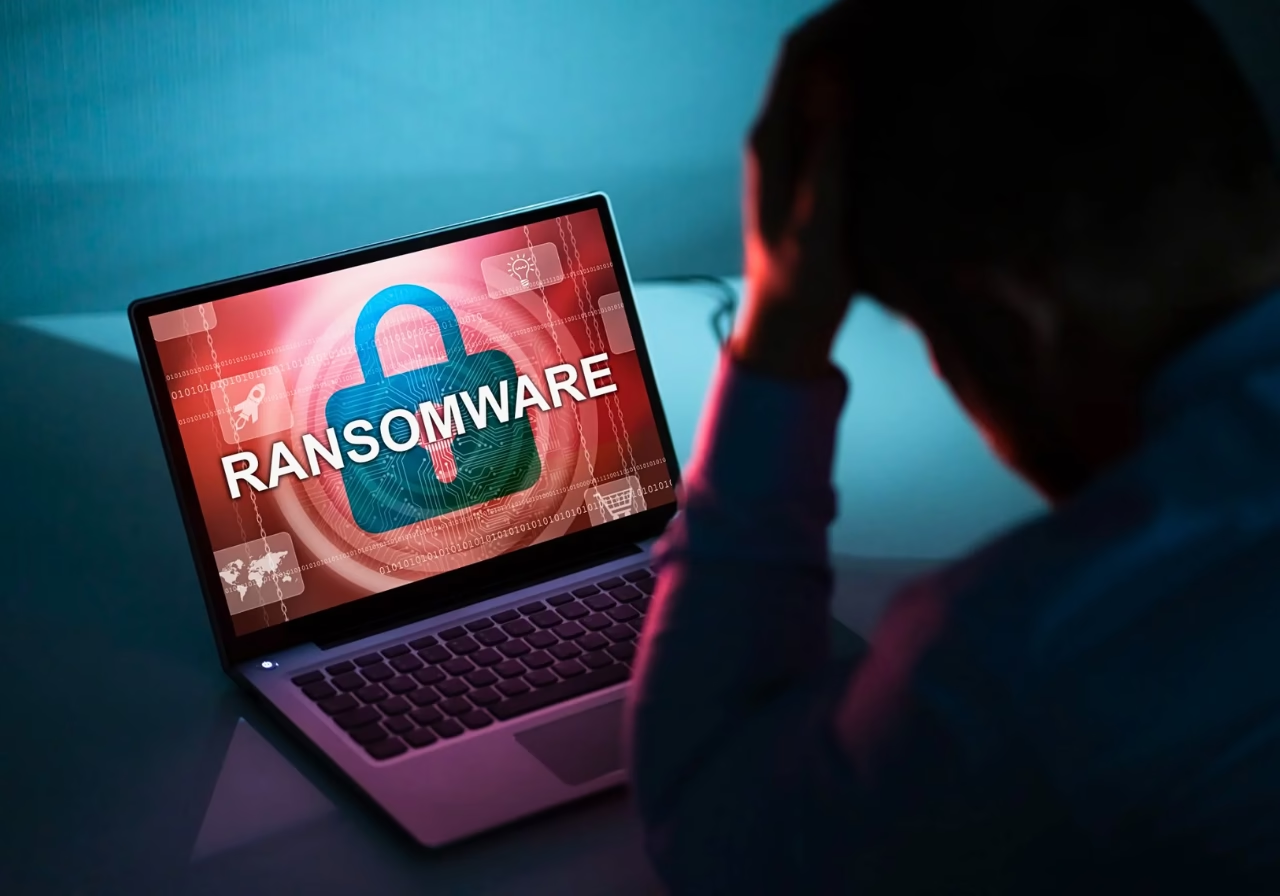Ransomware protection is more important than ever for healthcare providers in Tampa Bay. As ransomware attacks continue to rise, healthcare organizations face an increasing risk of data breaches, operational disruptions, and financial losses. Medical records and patient data are prime targets for cybercriminals, making it essential to safeguard sensitive information with cybersecurity solutions specialized to the healthcare industry.
In this article, we will outline the 12 Effective Ransomware Protection Strategies that healthcare providers in Tampa Bay must implement to secure their operations and minimize the risks of ransomware attacks in 2025.
What is Ransomware and Why is it a Concern for Healthcare?
Ransomware is a malicious form of software that locks or encrypts a victim’s data, demanding a ransom payment for its release. For healthcare providers, ransomware attacks can be catastrophic, as patient health information (PHI) is a highly sought-after asset for hackers. Ransomware attacks disrupt healthcare systems, compromise patient care, and result in financial and reputational damage.
The urgency of ransomware protection for healthcare providers in Tampa Bay lies in the sensitive nature of healthcare data. These attacks often target outdated systems and vulnerable software, which healthcare providers must address before the next attack strikes.
The Current State of Cybersecurity in Tampa Bay Healthcare
Healthcare providers in Tampa Bay are facing mounting challenges from ransomware threats. With many local healthcare systems still running on legacy infrastructure, the risk of an attack is growing. Small and mid-sized healthcare providers are particularly vulnerable due to limited resources for implementing modern cybersecurity systems.
Reports of ransomware attacks in Tampa Bay highlight the urgent requirement for healthcare providers to adopt cybersecurity best practices to protect patient data and prevent downtime that could disrupt patient care.
Top Risks of Ransomware to Healthcare Providers
Ransomware attacks pose several critical risks to healthcare providers in Tampa Bay, including:
- Patient Data at Risk: Cybercriminals target medical records and patient health data for identity theft, insurance fraud, and privacy violations.
- Operational Disruptions: Attacks can shut down essential healthcare systems, delaying appointments, procedures, and jeopardizing patient care.
- Financial Impact: The cost of ransom payments, system recovery, and legal fees can be crippling for healthcare providers. Indirect costs, like lost revenue due to operational downtime, are also substantial.
Ransomware Protection for Tampa Bay Healthcare Providers
To protect healthcare organizations from ransomware attacks, Tampa Bay businesses should implement the following 12 essential IT solutions:
1. Cloud Backup and Data Recovery Solutions
Cloud-based backup solutions are one of the most effective ways to safeguard critical healthcare data. Storing your medical records and patient data in secure cloud environments ensures that even if your local systems are compromised, your data remains safe. Cloud backups also enable remote access to files, which can help maintain operations during recovery.
2. Off-Site Data Storage
In addition to cloud backups, off-site data storage provides an extra layer of protection for your healthcare data. By keeping backups in geographically separated locations, you reduce the risk of losing both your original and backup data in a single disaster.
3. Remote Work Solutions
Remote work solutions are critical for maintaining business continuity during disruptions like hurricanes or power outages. Cloud-based communication tools, such as Microsoft Teams, Slack, and Zoom, enable healthcare teams to collaborate and access necessary systems from any location.
4. Network Security and Firewall Protection
Network security is essential for protecting healthcare data from cyberattacks. Invest in firewalls, intrusion detection systems, and endpoint security to keep your network secure and prevent unauthorized access. Regular updates and patch management are crucial to addressing vulnerabilities.
5. Uninterruptible Power Supply (UPS) Systems
A UPS system ensures that critical IT equipment remains operational during power outages. By providing backup power, UPS systems help prevent data loss and downtime, ensuring that your healthcare facility remains operational even during storm-related outages.
6. Business Continuity Planning (BCP)
BCP ensures that your healthcare organization can continue to operate during a disaster. Your business continuity plan should include IT recovery protocols, remote work strategies, and communication procedures to maintain patient care and operational integrity.
7. Mobile Communication Solutions
Mobile communication tools are essential during emergencies when traditional communication channels are disrupted. Voice-over-internet Protocol (VoIP) services and instant messaging platforms can keep your healthcare team connected and informed, even when the office is inaccessible.
8. Disaster Recovery as a Service (DRaaS)
DRaaS provides cloud-based disaster recovery solutions that allow healthcare organizations to restore systems and data quickly after a ransomware attack. By mirroring your IT infrastructure in the cloud, DRaaS enables fast recovery with minimal downtime and data loss.
9. Virtual Private Network (VPN)
A VPN ensures secure connections for remote workers, allowing them to access sensitive healthcare systems without compromising security. VPNs are critical during a disaster when employees require secure access to systems from home or temporary locations.
10. IT Support and Managed Services
Managed IT services offer ongoing monitoring and support, ensuring that your healthcare facility is always prepared for cyber threats. A dedicated IT support team can help prevent ransomware attacks, provide rapid response during disruptions, and ensure that your systems remain secure.
11. Hardware and Infrastructure Maintenance
Regular maintenance of IT hardware and infrastructure ensures that your systems are not vulnerable to attack. Secure critical equipment, such as servers and network devices, to prevent physical damage during a storm and reduce the risk of an attack.
12. Cybersecurity Training for Employees
Employee cybersecurity training is essential for preventing phishing attacks and other social engineering tactics that often lead to ransomware. Regular training ensures that your team can recognize and respond to potential threats.
IT Solutions for Tampa Bay Healthcare Businesses
Tampa Bay healthcare providers should implement these IT solutions in stages, beginning with cloud backups and network security. Work with IT professionals to evaluate your current systems, identify vulnerabilities, and prioritize the most critical solutions. Partnering with local IT providers ensures seamless integration of these solutions into your organization.
Case Studies: Ransomware Attacks in Tampa Bay Healthcare
Local Tampa Bay healthcare providers have experienced the devastating impact of ransomware attacks. In 2023, a Tampa Bay hospital was forced to shut down its electronic health records system after an attack, causing delays in patient care. The hospital was able to recover after implementing better backup solutions and employee training, but the attack resulted in substantial financial losses and disruptions to patient care.
Partnering with Cybersecurity Experts in Tampa Bay
To effectively protect against ransomware, healthcare providers in Tampa Bay should consider partnering with cybersecurity experts. These professionals can assess vulnerabilities, deploy the latest security technologies, and monitor systems for potential threats. Regular cybersecurity assessments will help identify new risks and ensure that your organization remains protected.
Virtual IT Group ensures your healthcare organization and IT infrastructure is protected from ransomware. Visit our website to learn more about our IT security solutions. You can also leave your information, and our team will reach out directly. For quick assistance, maximize our web chat feature for instant support. Let’s get your organization prepared for 2025 and beyond!
FAQs
What steps should I take to protect my healthcare organization from ransomware?
Implement cloud backups, network security, and cybersecurity training for employees to reduce the risk of a ransomware attack.
How often should I back up my medical records?
Daily backups ensure that you can quickly restore your data if attacked. Store backups in secure, off-site locations.
What role does AI play in preventing ransomware?
AI systems monitor network behavior, detect unusual activity, and provide real-time alerts to prevent ransomware attacks.
Is HIPAA compliance enough to prevent ransomware?
HIPAA compliance is essential, but additional security measures like firewalls and regular software updates are necessary to fully protect against ransomware.



